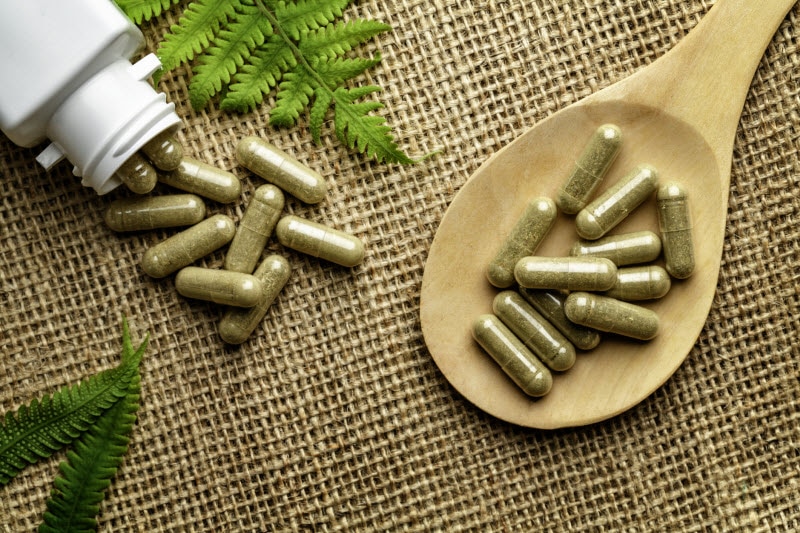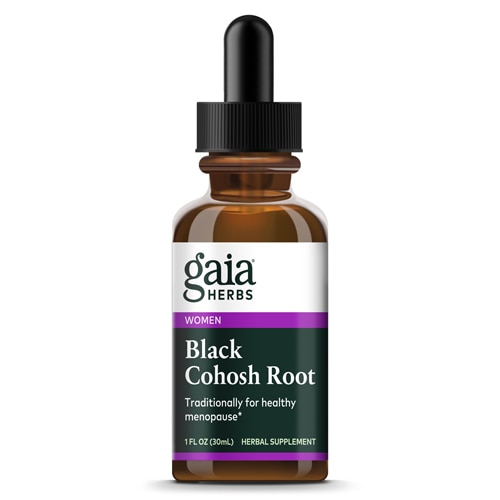[vc_row][vc_column][vc_column_text]If you haven’t noticed, the once-secret stage of
perimenopause has gone from a mostly silent subject to a hot topic. Halle Berry, Drew Barrymore, Michelle Obama and other luminaries have discussed it openly. “Femtech” companies have pledged to “disrupt” it. Gwyneth Paltrow has chronicled her experience on Instagram, and Oprah went on to found “The Menopause Talk” on her hit network show. Meanwhile, over on TikTok, #perimenopause has garnered 457 million views—and counting.

It is, in a word, a relief. Shining a spotlight on what is arguably one of the most significant eras of a woman’s life has helped countless individuals understand what, precisely, is going on with their bodies and navigate the wide range of symptoms that accompany it.
But if there’s one part of the perimenopause puzzle that could use greater illumination, it’s how nature can provide a respite. From magnolia bark for those dips in libido to passionflower for those bursts of anxiety, Mother Earth abounds with promising remedies.
†
With this in mind, I’ve curated the top six botanicals you might want to add to your perimenopause management kit.
What is perimenopause?
But first, what is perimenopause?
Occasionally referred to as “the menopausal transition,”
perimenopause refers to the eight to ten years that precede the complete cessation of your period (what’s technically
menopause, which is formally defined as not menstruating for 12 consecutive months or more). During this time, production of two key hormones—estrogen and progesterone—begins to decline as the ovaries start heading towards what I like to call a “career change.”
As natural and expected as these hormone fluctuations may be, they tend to arrive with a host of symptoms, such as:
- Shorter, irregular periods
- Brain fog
- Night sweats
- Weight gain
- Hot flashes
- Memory issues
- Sleep problems
- Achy joints
- Hair loss
- Depression
- Vaginal dryness
- Heart palpitations
- Headaches
- Difficulty concentrating
Sound familiar? If so, trust that you’re not alone: it’s estimated that nearly 90 percent of perimenopausal women seek out coping strategies from their physicians.
And yet, the world of botanicals is a relatively untapped market for finding perimenopausal support. Here are 6 of the most beneficial, the specific symptoms they address—and alternative ways you can gracefully handle what might emerge during this phase.
Herbs for Perimenopause
1. For relief from hot flashes, try red clover†
Red clover, or
Trifolium pratanse L., is rich in isoflavones, which may help with the frequency and intensity of
temporary hot flashes—a side effect of perimenopause that strikes approximately 75 percent of women. According to an older meta-analysis published in the
Journal of Obstetrics and Gynecology Research, red clover may be
especially suitable for perimenopausal women who have “severe” hot flashes (or more than five per day).
†
What’s more, other studies have indicated that the member of the legume family may
organically support bone health and help with some skin issues—a common complaint during perimenopause, when women may face (literally) everything from dry patches to a loss of elasticity.
†
Bonus tip: Download that meditation app: Emerging research indicates that
strengthening the mind-body connection through mindfulness meditation may help you deal with those feverish “power surges.”
2. For mood support, try ashwagandha†
A recent study on 40,000 perimenopausal women discovered that a nearly-breathtaking
60 percent of them experienced severe anxiety and/or depression. What’s the connection?
Estrogen and the “feel good” brain chemical serotonin have an intimate relationship: When estrogen rises during the follicular stage of the menstrual cycle, serotonin follows suit. And when estrogen plummets? Serotonin plunges as well.
Perimenopause is characterized as a gradual loss of estrogen; hence its link to the blues. Furthermore, a drop in estrogen may trigger a surplus of the “stress hormone” cortisol and provoke feelings of angst.
Enter the potential of ashwagandha. The Ayurvedic powerhouse has been leveraged for thousands of years for its capacity to naturally promote a more balanced mood. It does so by acting as an
adaptogen—meaning, it may boost your resilience to biological, chemical and psychological stressors. Indeed, a systematic review published in 2021 found that “Indian cherry,” as it’s fondly called,
helped to support healthy stress levels in participants.
†
Bonus tip: Unroll your mat: A 2018 examination of 13 studies concluded that
yoga can be a boon for women grappling with the primary symptoms associated with this transitional period,
including psychological upsets like depression and anxiety.
3. For a break from night sweats, try black cohosh†
Consider night sweats hot flashes’ stealthy cousin: One minute, you’re bedding down in clean, cool sheets; the next, you’re waking up soaked in perspiration. What gives?
Known as one of the hallmark vasomotor symptoms of perimenopause, night sweats are, once again, due to hormone vacillations. More specifically, they’re caused by the impact these shifts have on the brain: the hypothalamus (the part of your brain responsible for moderating your body temperature) may have trouble regulating your internal thermostat and cause sudden flushes of heat to your neck, chest, face and scalp.
Black cohosh may organically support the body's hormone equilibrium. Discovered by Native Americans more than two centuries ago, it was traditionally used to temper the symptoms of menstruation
and perimenopause, including hot flashes and their consequent night sweats.
†
Do note that research on the root of
Cimicfuga racemose is mixed, so be sure to discuss with your healthcare provider whether it's right for you.
Bonus tip: Set the thermostat in your room to 65 degrees before you get under the covers. This may dial down your core temperature and leave you waking up refreshed, not
drenched.
4. For enlivening your libido, try maca†
Sex isn’t just an enjoyable part of life: A large body of research shows that it may bolster immune health, enhance your self-esteem, curb stress and encourage a better night’s sleep.
Alas, the physical changes that often go hand in hand in perimenopause—such as weight gain and vaginal dryness—can turn intimacy into a daunting, even painful act. At the same time, mood changes and feeling ill at ease in your skin can dampen your sexual desire.
Maca may be helpful for this due to its ability to naturally support energy and vitality while further nourishing balance in the body. Known as “Peruvian ginseng,” the South American plant is also jam-packed with vitamins, minerals and fiber, all of which you need to sustain holistic well-being.
†
Bonus tip: Indulge in a slice of dark chocolate: Research indicates that the sweet stuff elevates dopamine and serotonin, which could very well qualify as the brain’s aphrodisiacs.
5. For healthier hair, try saw palmetto†
One of the more shocking parts of perimenopause (and aging in general) just might be the sight of thinning hair, especially if you’ve long had lustrous locks. This, too, is part and parcel of celebrating each new turn around the sun, and it’s caused by—you guessed it—decreased estrogen and progesterone, both of which have a hand in hair growth and thickness. Additionally, androgen production escalates during perimenopause and may cause hair follicles to
shrink.
Fortunately, help does exist. Saw palmetto, one of nature’s jewels that grows throughout the Southeastern stretch of the U.S., may help promote healthy hair.
†
How? A slightly older study demonstrated that saw palmetto interacts with 5-alpha reductase, a key enzyme involved with testosterone's conversion to dihydrotestosterone (DHT), a sex hormone linked to hair health. Another, more recent study featured in
Clinical, Cosmetic, and Investigational Dermatology found that oral and topical saw palmetto
supported healthy hair in subjects with alopecia.†
Bonus tip: Pile your plate with antioxidant-dense eats that may stimulate hair growth, such as:
- Eggs
- Spinach
- Berries
- Avocados
- Nuts and seeds
- Sweet potatoes
- Fatty fish
6. For overall comfort, try chaste tree berry†
Chaste treeberry, or vitex, as it’s commonly called, has become the gold standard for perimenopausal
and menopausal women. Brimming with plant compounds—including alkaloids and antioxidant flavonoids—it’s been comprehensively studied for its facility to mitigate discomforts associated with the menstrual cycle (and sometimes perimenopause can feel like ongoing PMS). It has been called a “phyto-progesterone” or plant that helps to support your body's own healthy production of progesterone.
†
Bonus tip: Try hydrotherapy. Whether you have achy joints or a full-body (and brain) feeling of
blah, cold and hot water therapy may simultaneously soothe stiffness and give you a jolt of energy.
Above all? Take care of yourself from the inside out with a nutrient-rich diet, ample exercise, and consistent, restorative sleep. And remember: while perimenopause may be uncomfortable at times, it’s also the bridge to an often freer, wiser, and more glorious time of life.
†These statements have not been approved by the Food and Drug Administration. These products are not intended to diagnose, treat, cure or prevent disease.[/vc_column_text][/vc_column][/vc_row][vc_row][vc_column][vc_text_separator title="Featured Products" border_width="2"][vc_row_inner equal_height="yes" content_placement="middle" gap="35"][vc_column_inner width="1/3"][vc_single_image image="177545" img_size="full" alignment="center" onclick="custom_link" img_link_target="_blank" css=".vc_custom_1724606949629{padding-right: 7% !important;padding-left: 7% !important;}" link="https://www.vitacost.com/health-her-perimenopause-multi-nutrient-support"][/vc_column_inner][vc_column_inner width="1/3"][vc_single_image image="177546" img_size="full" alignment="center" onclick="custom_link" img_link_target="_blank" css=".vc_custom_1724606965849{padding-right: 7% !important;padding-left: 7% !important;}" link="https://www.vitacost.com/amberen-advanced-perimenopause-relief"][/vc_column_inner][vc_column_inner width="1/3"][vc_single_image image="177544" img_size="full" alignment="center" onclick="custom_link" img_link_target="_blank" css=".vc_custom_1724606980313{padding-right: 7% !important;padding-left: 7% !important;}" link="https://www.vitacost.com/wile-perimenopause-support-capsule"][/vc_column_inner][/vc_row_inner][/vc_column][/vc_row]
 It is, in a word, a relief. Shining a spotlight on what is arguably one of the most significant eras of a woman’s life has helped countless individuals understand what, precisely, is going on with their bodies and navigate the wide range of symptoms that accompany it.
But if there’s one part of the perimenopause puzzle that could use greater illumination, it’s how nature can provide a respite. From magnolia bark for those dips in libido to passionflower for those bursts of anxiety, Mother Earth abounds with promising remedies.†
With this in mind, I’ve curated the top six botanicals you might want to add to your perimenopause management kit.
It is, in a word, a relief. Shining a spotlight on what is arguably one of the most significant eras of a woman’s life has helped countless individuals understand what, precisely, is going on with their bodies and navigate the wide range of symptoms that accompany it.
But if there’s one part of the perimenopause puzzle that could use greater illumination, it’s how nature can provide a respite. From magnolia bark for those dips in libido to passionflower for those bursts of anxiety, Mother Earth abounds with promising remedies.†
With this in mind, I’ve curated the top six botanicals you might want to add to your perimenopause management kit.



